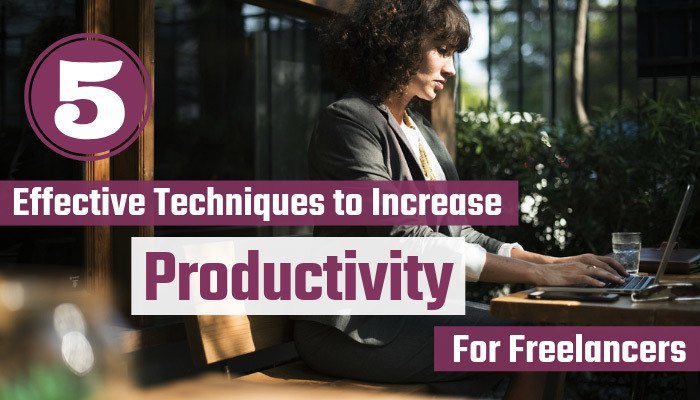What is productivity? Let's start with answering this important question. Productivity means effectively completing tasks. Therefore, it entails efficacy and completion. This means a goal-orientated activity, that is, accomplishing tasks, with a method that can focus, prioritise, and get things done. Hence the entanglement of the word "productivity" with focusing, prioritisation, time management, and fending off procrastination.
Productivity, i.e. the ability to get things done, becomes more pressing for those who work from home, the self-employed, and freelancers. When you are your own boss, you lack a network of support which could help you with assigning tasks and setting and meeting deadlines.

In this article, I will outline 5 techniques which can help you keep motivated, manage your time better, prioritise your tasks, and increase your productivity rate. The techniques are very simple and easy to carry out and they are often converging on each other. That is to say, you may only need one of them to succeed, or sometimes a combination of a few.
1. Diary Management
First and foremost, as a self-employed person you need to keep motivated. Due to lack of colleagues and line managers, keeping motivated for those working on their own is often a challenge. This very simple diary management technique can help you keep motivated.
Before going to bed, you simply need to try filling in your diary or calendar app with tasks and your daily routine, including your lunch break, the emails that need to be drafted and sent to your clients, and every little task that needs to be done. Enter all things related to your project into your diary and commit to carrying them out. You should plan the next day the night before because you will feel more motivated waking up to plans rather than to a sense of disorientation. This technique not only will keep you motivated, it will enable you to get things done as well.
2. The Ivy Lee Method
This is another simple and accessible technique that you may want to use in order to increase your productivity. The Ivy Lee method is concerned with prioritisation. The way it works is straightforward: before going to bed you come up with 6 important tasks that you wish to undertake the next day and you sort them in the order of importance. The next day you begin working on your list, crossing them one by one off your list.
Personally, my recommendation to freelancers is to come up with 3 important tasks that they need to accomplish the next day, since freelancers often work on 2 or 3 projects per day. If you have one project, break it into smaller tasks, and then prioritise them. The Ivy Lee technique works best if used in conjunction with the diary management technique explained above.
3. The “5 – 4 – 3 – 2 – 1 – Go!” Technique
Freelancers grapple with keeping focused on a daily basis as their work environment, which is often their own home, is a carnival of distracting elements: from temptation of going for a long shower to the thought of restocking the fridge, from watching your favourite TV programme, to falling into the bottomless labyrinth of daydreaming—the distractions are endless. The “5 – 4 – 3 – 2 – 1 – Go!” technique can help you stop procrastinating and focus more on the task at hand.
It is a very easy method to follow: start counting down from 5, launch into your work, and commit to working at a leisurely speed for only 20 minutes. You will soon realise that the subconscious fear of dealing with the task has faded away and that you have been working on your project for almost an hour!
4. Self-Care Plan

Without a self-care plan, your resting time could either be spent on working on your projects or wasted on worrying about your work. It is very important that you completely turn off after work and let your brain rest. By “self-care plan” I am not referring to specific and prescribed plans. Self-care is subjective. But to give you a few ideas, try stretching, listen to your favourite radio show, spend quality time with your friends and family, or make a happy Spotify playlist. Just make sure you set aside time (even if it’s five minutes) and do a bit of self-care.
It's best to add them to your calendar to ensure you will commit to them (back to Method 1). You can combine self-care and mindfulness and transform your ordinary tasks, such as taking a shower, shopping for grocery, or even brushing your teeth, into activities that would allow your mind to enjoy those activities without stressing about work. These activities will increase your productivity by making you feel refreshed and enabling you to focus on your to-do list.
5. Knowing Your Limits
Knowing your limitations can be a major source of power. Invest in understanding what your limits are. If you cannot work for seven solid hours, then pushing yourself to do so is both unhealthy and counterproductive. Moreover, by knowing your mental and physical confines you will be able to give a realistic timeline to your clients without deteriorating your own mental and physical well-being. Freelancing is not supposed to hurt and being self-employed could be, and I believe should be, a pleasant experience for you and those around you. If there are elements of your work that cause you distress and anxiety, take note of them and devise strategies to avoid them. Be honest about your limits with yourself and your clients.

For example, I have intermediate knowledge of CSS. If a client asked me to write content for their website and at the same time optimise their website’s functionality in regard to the CSS clutter, I would say no to their second request, as I know too well that it would demand hours of painstaking and slow work which is beyond my limits. I would inform the client of what I am (a content writer) and what I am not (a professional web designer) and would advise them to assign the CSS optimisation task to a person with CSS, HTML, and JavaScript expertise. If the client insisted on carrying out both tasks, I would simply decline the offer as it would be in the best interest of my client, and most importantly, myself.
Knowing your abilities and inabilities is the only way of establishing an honest and truly bilateral relationship with your clients which, in return, will contribute your business’s or brand’s productivity.

Julia is a content writer, editor, and communications strategist. She has written and edited articles for commercial and cultural venues as well as for professional magazines. She is currently communications strategist for two independent, ethical brands in London. She actively posts original content on her blog, A Lush Idea, covering a wide range of topics such as productivity, marketing, culture, health, travel, and technology. Get in touch for freelance hire or simply to say hi.
Author // Julia Smith
